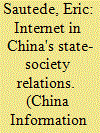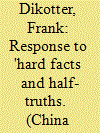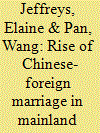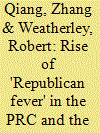|
|
|
Sort Order |
|
|
|
Items / Page
|
|
|
|
|
|
|
| Srl | Item |
| 1 |
ID:
129447


|
|
|
|
|
| Publication |
2013.
|
| Summary/Abstract |
Notwithstanding the role that opium and narcotics have played in China's history, drug use, trafficking and other drug-related problems have been consistently condemned by the Chinese government as social vices. After being a 'drug-free' nation from the 1950s to the 1970s, drug problems resurfaced in the 1980s and China was forced to deal with such problems once again. The Chinese government is well known for its tight control over the media, and for its ability to utilize propaganda to win public support and carry out its policies. However, the Chinese government's use of the media and propaganda to deal with drug issues has never been explored. Based on longitudinal data collected from the People's Daily (from 1946 to 2009), this study examines two key issues: the ways in which the government has utilized ideology in its official stories over time, and the means through which the government has tried to re-establish its drug control in the 21st century. The data suggest that the use of 'hard-core' ideology as a tool has not only drastically declined over time but also undergone significant modifications. The Chinese government has adopted a multifaceted approach to drug control and it has managed to present a unified voice in the media in combatting drug problems.
|
|
|
|
|
|
|
|
|
|
|
|
|
|
|
|
| 2 |
ID:
129448


|
|
|
|
|
| Publication |
2013.
|
| Summary/Abstract |
This article explores how state and society relations have been affected by the development of information technology in China over the past 20 years. It argues that despite all the transformative changes that such technology has helped bring about, 'benefits' have to be weighed in terms of both empowerment of society and strengthening of state capacity. Ultimately, the digital challenge has not translated into a weakening of the authoritarian state, and this can be explained by the very nature of the party-state in China and how it has managed to make use of communication tools that prove to be both constructive and divisive.
|
|
|
|
|
|
|
|
|
|
|
|
|
|
|
|
| 3 |
ID:
129450


|
|
|
|
|
| Publication |
2013.
|
| Summary/Abstract |
It is a rather perplexing task to respond to Anthony Garnaut's criticisms of Mao's Great Famine,1 in as much as his review2 provides ever-shifting characterizations of my book. The reader initially learns that, taken on their own, its first 16 chapters of 'general narrative' would represent 'a worthy sequel' (p. 232) to my earlier volume on Republican China.3 Unfortunately, the following 21 chapters of 'archival anecdotes stripped of geographical, temporal, and institutional context … are likely to generate discomfort on the part of the reader but not comprehension' (p. 232). Next, in what he describes as a
'pedantic exercise in cross-referencing footnotes' (p. 233), he claims that the first section of Mao's Great Famine owes 'a large unacknowledged debt to Yang Jisheng' (p. 233) and his pioneering study Tombstone,4 alleging that, in a series of 'unlikely coincidences' (p. 234), the sources I used in those chapters are heavily dependent upon leads taken from Tombstone. He then dissects one chapter's footnotes in detail, but rather grudgingly has to admit that later in that same chapter 'some illustrations of what communization meant in practice' are 'all [Dikötter's] own' (p. 234). Yet ultimately, a mere two and
one-half pages after judging them a worthy sequel to The Age of Openness: China before Mao, he complains that my 'chapters that describe the genesis of Great Leap policies' simply 'strip Yang's archival discoveries and synthesis of published material of the his- torical context provided by Yang' and then 'rearrange the resulting fragments into an idiosyncratic vignette of totalitarian folly' (p. 234). Both can hardly be true.
|
|
|
|
|
|
|
|
|
|
|
|
|
|
|
|
| 4 |
ID:
129449


|
|
|
|
|
| Publication |
2013.
|
| Summary/Abstract |
This research note examines the growth of Chinese-foreign marriage in mainland China since 1979. From the founding of the People's Republic of China (PRC) in 1949 until the early 1990s, Chinese-foreign marriage was an unusual occurrence in the country. Statistics compiled by the PRC's Ministry of Civil Affairs indicate that the number of couples registering a Chinese-foreign marriage in mainland China increased almost tenfold between 1979 and 2010, although that figure has since stabilized at a lower rate. The article explores these changes in three stages. First, it maps the architecture of the PRC's Marriage Laws and reform-era regulations on marriage registration, showing how Chinese-foreign marriages have been categorized as different types of 'cross-border' and international marriages. Second, it provides a statistical breakdown of the number, type and gendered composition of Chinese-foreign marriages registered in mainland China between 1979 and 2010. It concludes by highlighting the gendered character and spatial dimensions of mainland Chinese-foreign marriages, and pointing to their largely 'intracultural' as opposed to international bases.
|
|
|
|
|
|
|
|
|
|
|
|
|
|
|
|
| 5 |
ID:
129446


|
|
|
|
|
| Publication |
2013.
|
| Summary/Abstract |
This article examines the upsurge in Chinese public support for the legacy of the Republican era, a phenomenon known as 'Republican fever'. The fever has arisen following the formal relaxation of restrictions on discussing the Republican period. The rationale for doing so is linked to political expediency and in particular to the CCP's quest for nationalist legitimacy. By acknowledging the positive aspects of the Republican era as part of a placatory policy on reunification with Taiwan, the CCP is trying to present itself as a key partner in a united patriotic front with the Kuomintang. But things have not turned out as planned. As Republican fever has spread across a diverse section of Chinese society, so too has criticism of the CCP's record in power. In light of this, we argue that instead of fortifying the Party's nationalist legitimacy, the CCP has unwittingly started a process which appears to be eroding that legitimacy.
|
|
|
|
|
|
|
|
|
|
|
|
|
|
|
|
|
|
|
|
|